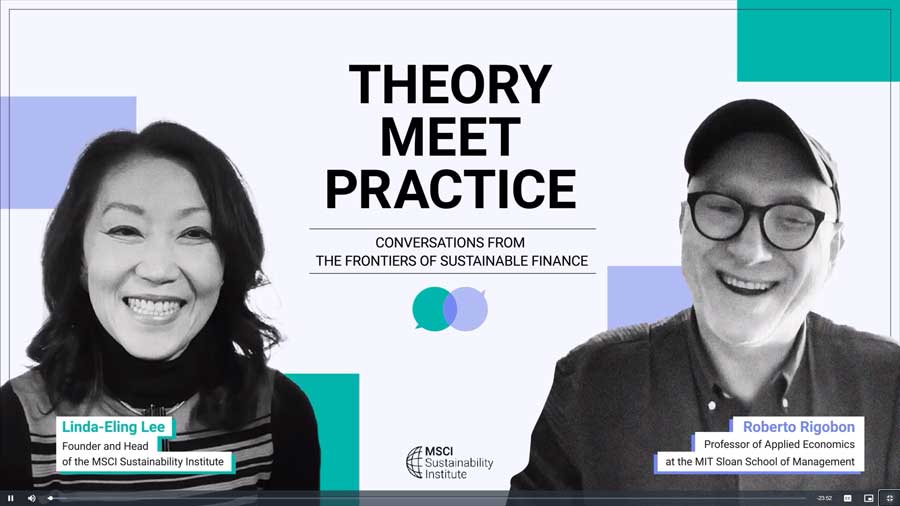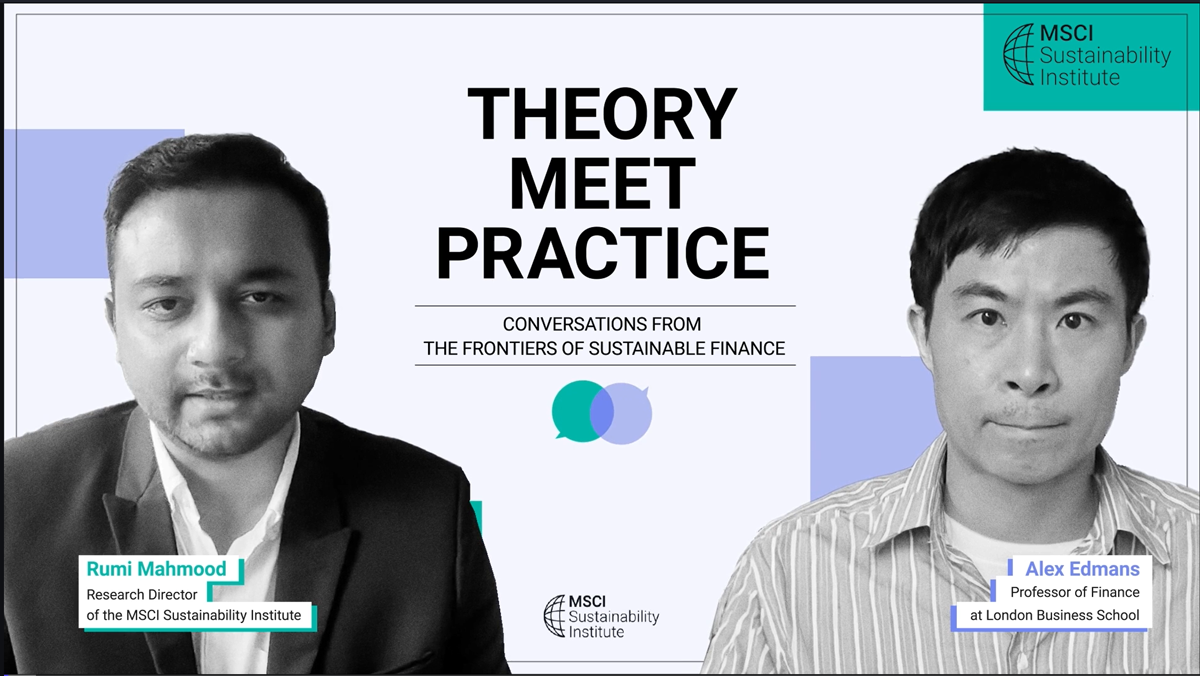Episode 3: Reading corporate sustainability news with Aaron Yoon
Think you know how sustainability news impacts companies’ stock prices? You might think again after watching our conversation with Aaron Yoon, a professor of accounting and information management at Northwestern University’s Kellogg School of Management, who breaks down the investment impact of financially materially ESG headlines. He also discusses his research uncovering drivers of sustainable value from the C-suite to supply chains, and how investors’ views on sustainability are shifting from reducing risk to creating value. We also learn why a paper about the power of customers to change corporate behavior could make for good reading if you’re stranded on a desert island.
Which sustainability-related news about companies matters most for investors? The short answer: News that could affect a company’s fundamentals based on its industry. The slightly longer answer: Positive news about the impact of a company’s products (think quality, safety affordability or access), which has generated a bigger reaction by investors than negative news of the same variety.
“
Aaron Yoon shares his desert island paper
What academic paper on sustainable finance (besides one of his own) would Aaron Yoon want with him if stranded on a desert island? “Socially Responsible Corporate Customers,” by Rui Dai, Hao Liang and Lilian Ng, he suggests, citing the paper’s insight into the power of customers to change suppliers’ behavior. “It gets at the role of different stakeholders,” Yoon observes. “While investors generally have felt a lot of both the responsibility and the opportunity to address sustainability, other stakeholders, particularly customers, whether they’re business customers or consumers, play a really big part in the equation in terms of shifting corporate behavior.”
We know both answers thanks to Aaron Yoon, an assistant professor of accounting and information management at Northwestern University’s Kellogg School of Management, who joined me recently on “Theory Meet Practice” to discuss his research into corporate ESG news and other drivers of sustainable value.
On average, news about product impact, classified more broadly under what Professor Yoon and his co-author George Serafeim term “social capital,” produced an increase in share price of nearly 1.9% on the day of the news and 2.4% over the three days surrounding it, based on their examination of more than 3,100 companies over roughly eight years. That compares with smaller reactions for negative social-capital news, which caused shares to tick down about 1.1% over a one-day period.
The finding may surprise companies and investors who think negative news outweighs positive news in impacting share prices or who believe environmental or governance factors outweigh social factors when considering material sustainability factors. Yoon says the finding also surprised him. “The paper could suggest that people’s view on ESG is shifting from risk mitigation to potential value creation,” he notes, “and from my understanding of the literature before the paper was written, there was very little evidence of this type of event study, not just on positive news but news that is financially material.”
‘A fresh angle’
It wouldn’t be the first time that Professor Yoon has helped investors think differently about the link between sustainability and shareholder value. His 2015 research with Mo Khan and George Serafeim showing that companies with good ratings on financially material sustainability issues significantly outperform companies with poor ratings on those issues marked what the Financial Times called “a turning point” in investors’ understanding.
Yoon has found, for example, that U.S.-listed companies with what he and co-author Kyle Welch term “high-ability” CEOs who allocate resources to sustainability efforts outperformed companies with low-ability CEOs and low investments in sustainability by 6.6% a year over the eight years that ended in 2020.
“If you think about it, it’s very intuitive because the compensation of CEOs and senior managers is often very tied to share price,” he notes. “So when managers are pressured to engage in ESG, they will pick ESG projects that increase near-term shareholder value.”
Less intuitive, perhaps, may be a recent finding by Yoon and co-authors Guoman She, Xuanpu Lin and Haoran Zhu that companies using responsible suppliers have outperformed those whose supply chains have more sustainability-related risks. U.S.-listed companies with the fewest sustainability incidents in their supply chains outperformed those with the most such incidents by nearly 6.8% annually between 2009 and 2020, they find.
“It’s been a fun project because we’ve created a proxy for supply chain risk management, and the gist of the paper is that that signal predicts future stock market performance,” notes Yoon, who says that investors tell him they’ve not previously thought about linking supply chain information to sustainability at particular companies because of difficulty in collecting the data.
“I’m interested in highlighting when and how different ESG issues create value,” he explains. “We’re in an era where people say that sustainability is important, but we don’t know which issues are important and why. I think the supply chain paper is an attempt to get at the question from a fresh angle.”


